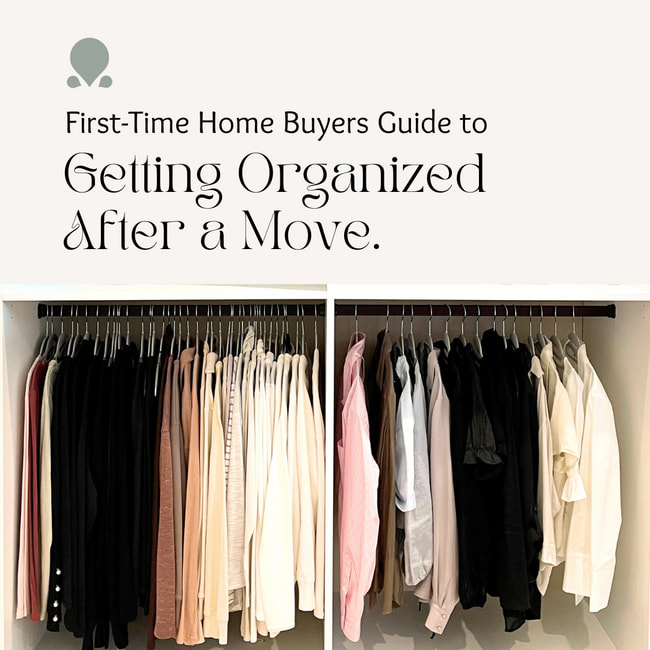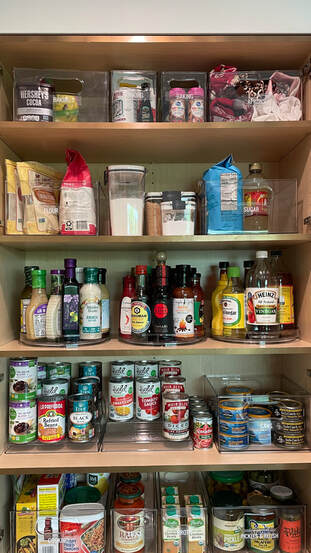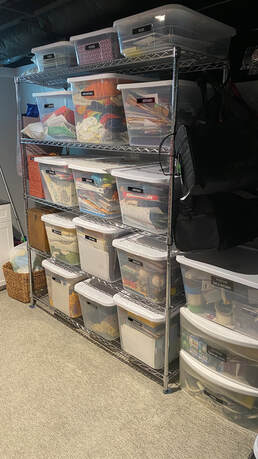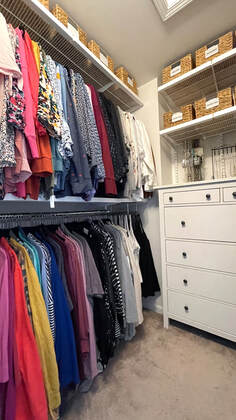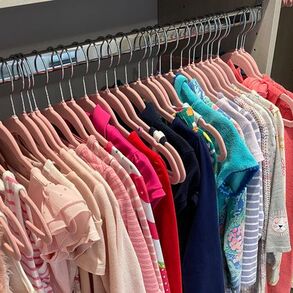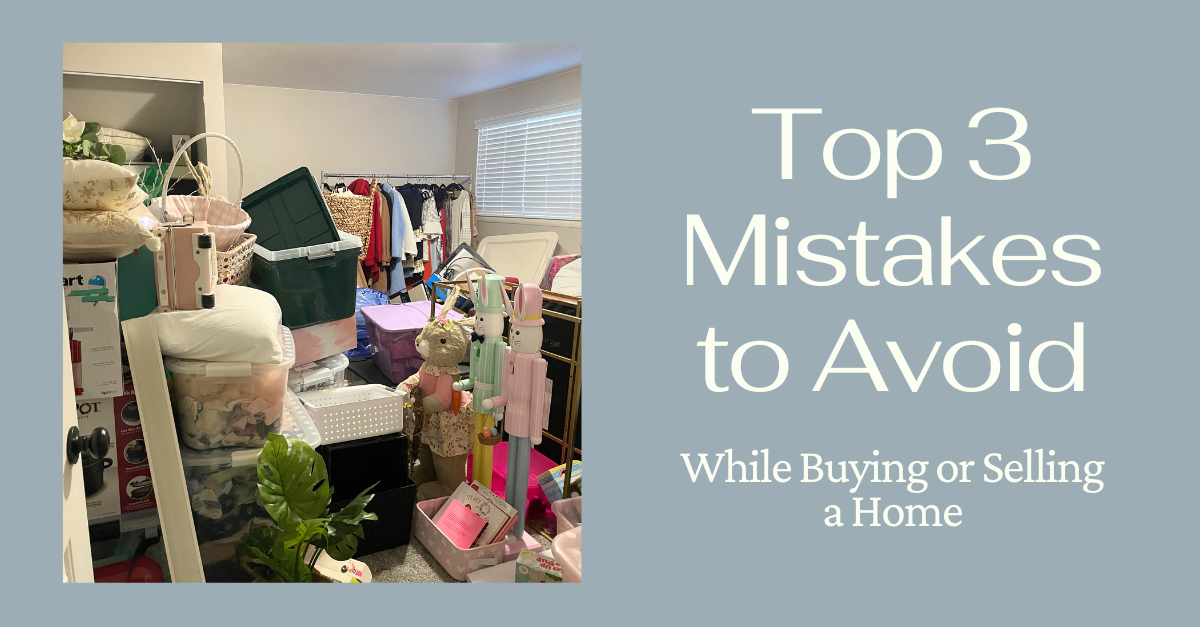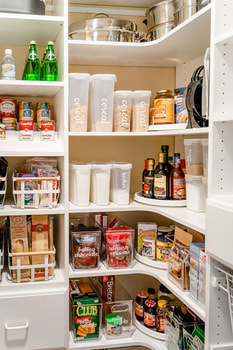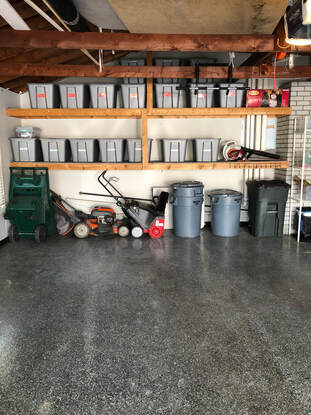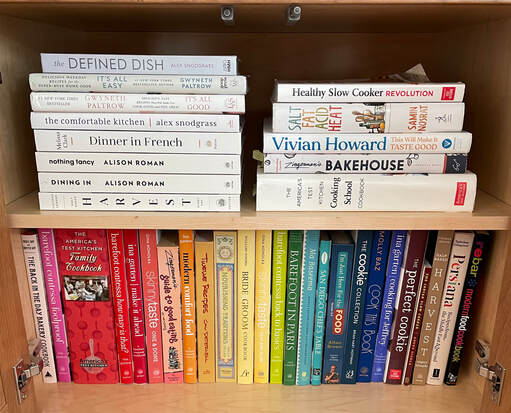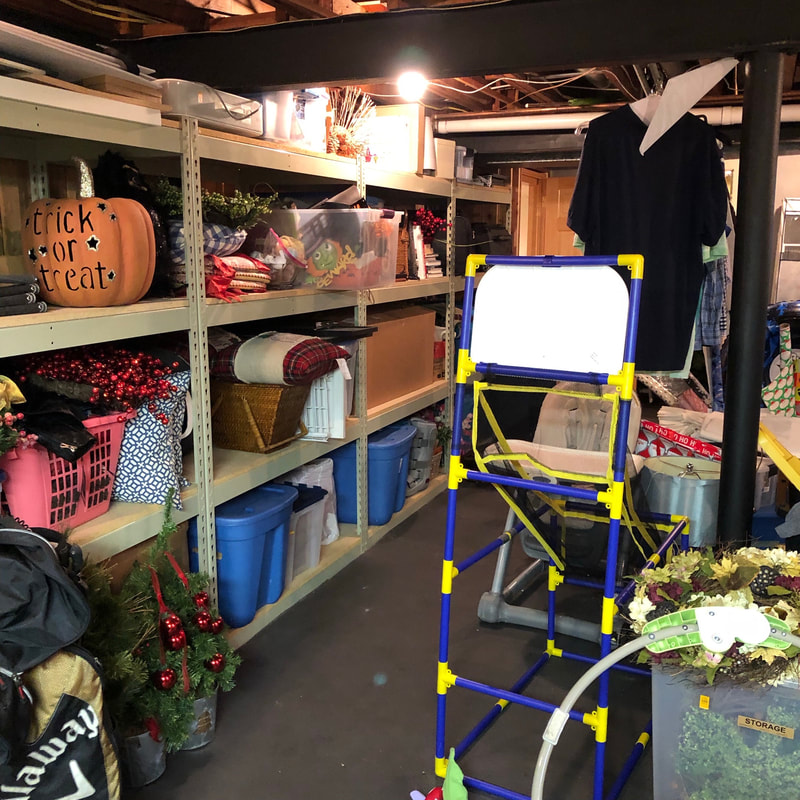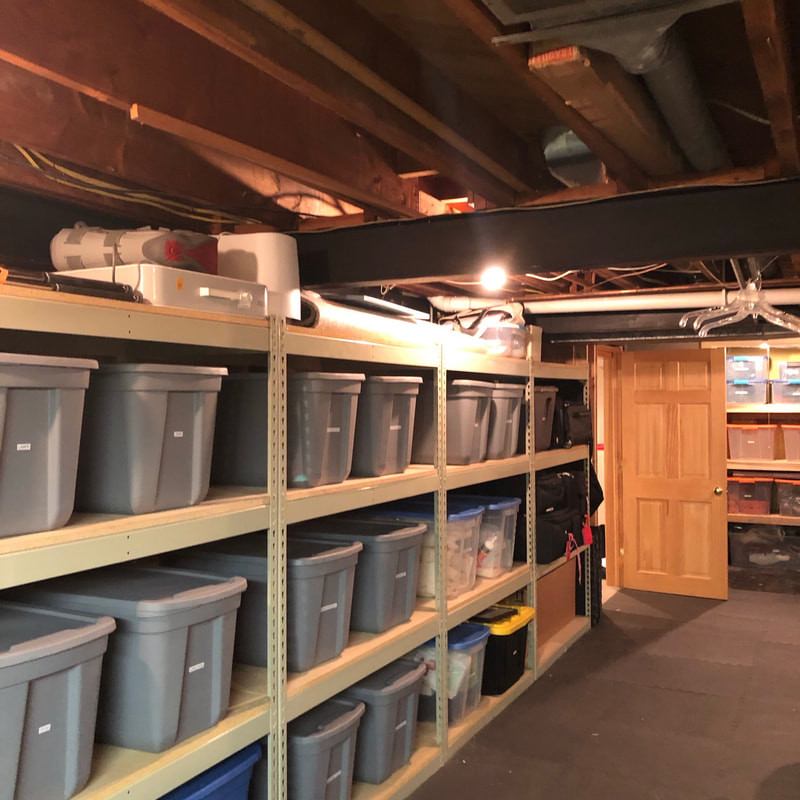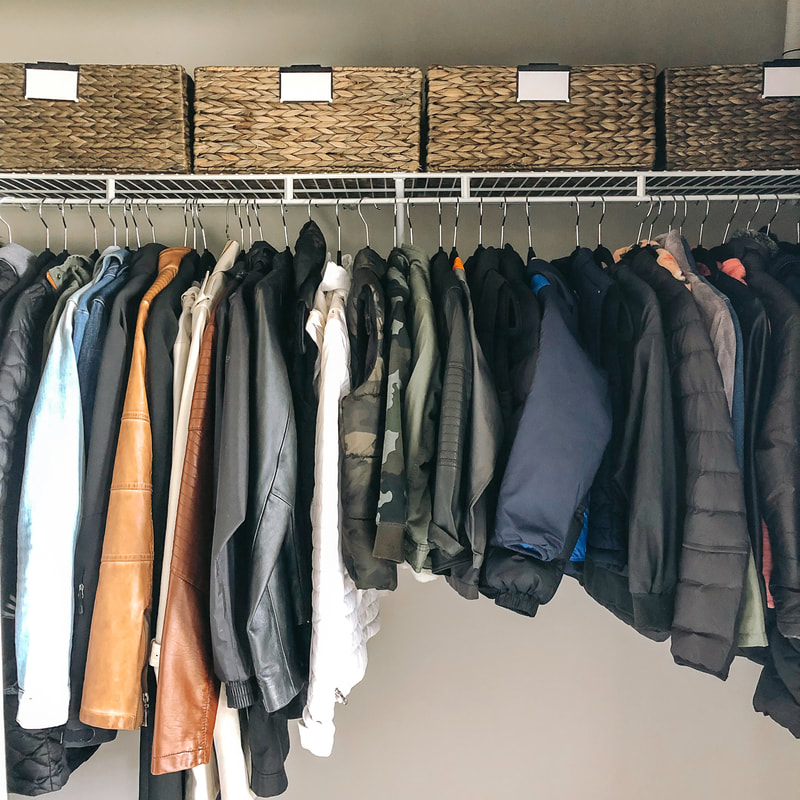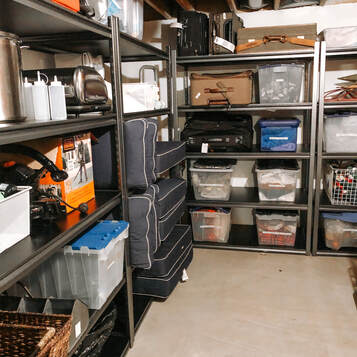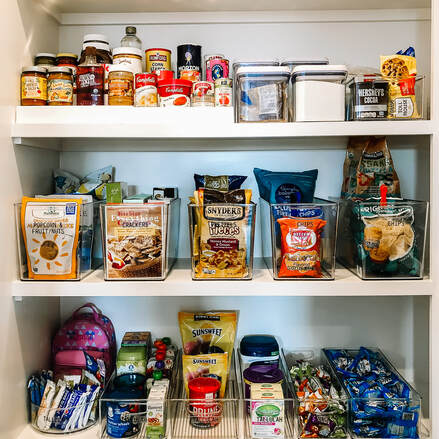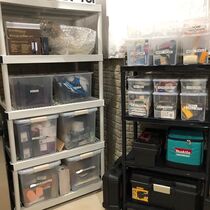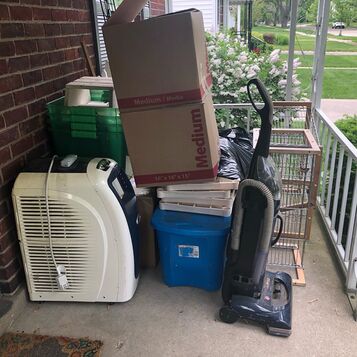|
Congratulations! You’ve bought your first home. Now it’s time to get it organized! If you start on the right foot in your new home your day-to-day stress will be lower, you’ll save money and you’ll enjoy the space more. So, where to begin? Here are the top tips for getting organized after buying your first home: Tip #1:When unpacking, sort similar items together before deciding on a home for them. Too often people pick a home for storing a category before completely unpacking, only to find out the space they chose originally isn’t big enough for how much they have. As a result, similar items land in multiple places throughout the home. Instead, sort everything first to get a birds-eye view of what you have overall, and then pick where each category goes. It will save you time and will also help you purge an excess amount of a category that you have too much of. Let's use kitchen spatulas as an example. Once you see all of your spatulas together, it will be easier to let go of the partially melted one when you see you’ve got three others still in great shape. Sorting first is hard because it does look like it’s getting worse before it gets better but I promise it’s the right way to do it and so worth it. This is especially important if there are two people’s belongings getting merged for the first time. Sort like with like every step of the way. If this feels especially daunting but you know it's important, this is the perfect opportunity to seek help from a professional organizing company. Tip #2:
Tip #3:Unpack every box, yes, every box. I know it may seem daunting but cardboard is not your friend (it gets moldy and musty quickly in basements) so move your belongings out of the moving boxes ASAP. I can’t tell you the number of times that I have organized homes where there are boxes that have never been unpacked after years of living in the home. They will come back to haunt you, so it is best to start out on the right foot and unpack every box. Have a box of keepsakes? Transfer those to a plastic tote with a lid to keep those treasures safe. Did you turn a kitchen drawer upside down and dump the contents into a box? Methodically unpack, sort, and redistribute the items to the correct room. You can do it! Your future self will thank you. Tip #4:Purge as you unpack. If you didn’t purge before you moved, now is the time to do it in your new home. Even if you came from a smaller apartment, odds are there are items you can purge. Be honest with yourself about what you need, use, and love, and get rid of what you don’t. Look for items that are worn, broken, or don’t fit anymore. Expired food should get tossed, and anything that doesn’t look appetizing should move out. Get rid of cookware you have duplicates of if you’re merging two people’s belongings. You’ll feel lighter and more free after your purge, and what better time to do it than with the clean slate of a new home? Tip #5:
Tip #6:Invest in matching hangers. Remember that closet where you just organized everything by type and color? Now it is time to go the extra mile and get matching hangers. We often recommend velvet hangers, but any slimline matching hangers will do. Make sure the metal of the hooks match and the color of the hangers match. It will transform your closet once you take this extra step. Tip #7:Don’t fill a space just to fill it. This is your first home so you may not fill every cabinet, shelf, or drawer. This is okay! It is organizing gold when you have empty spaces because it allows for room to grow. You’ll get new belongings down the road (housewarming party, holidays, birthdays, and shopping) so leave some space for the items that haven’t come into your home yet. Just because you have space doesn’t mean you have to fill it with something. It’s okay to let an open shelf be an open shelf until its purpose surfaces organically over time. Tip #8:Keep things tidy in your new home long-term by picking up as you go. For example, when you do your hair in the morning, instead of leaving the hairbrush, curling iron, and hairspray out on the counter, put those things back in their home (once cool to the touch for the curling iron) in drawers and cabinets. You’ll be amazed at how much faster it is to just pick up as you go instead of spending entire days on the weekend trying to backtrack and pick up what you didn’t put away. It takes just a few seconds to put something away the moment you’re done with it. This will also help you find the items faster the next time you or someone else you live with needs them. Tip #9:Invest in a label maker. They are worth having, especially if you live with another person/other people or have ADD/ADHD. Labels are a map and if everyone is reading the same map they’ll get to the same and correct destination. Pantries, basements, garages, closets, bathrooms, and nurseries are all some of the spaces that we regularly label. We love our Brother P Touch label maker and recommend it all the time. It will make life so much easier!
There you have it, those are the top tips for a first-time homeowner to get organized. If you follow these tips now and for all of your future homes you’ll be thankful, will have lower stress, and will save money. Feeling overwhelmed about where to begin or how to do these tips? We’ve got you! Just give us a call and we’ll help make your first home cozy, organized, and fresh. Congratulations again! Melissa Fortino
0 Comments
We all know that feeling of moving into a new home, unpacking and then realizing there were some things we should have paid closer attention to. Here are the Top 3 Mistakes to avoid while buying or selling a home from a Professional Organizer's perspective. Mistake Number 1: Underestimating how much storage space you need.You want to ensure you choose a home with enough storage in the basement and enough closet, pantry, kitchen and garage space for your family's needs. People often get swept away with the size of a home, architectural features or zip code. If the primary bedroom closet is a nightmare or you have nowhere to store your holiday décor or children's sports equipment, your new home will feel cramped. Storage space is essential, so here are some questions to keep in mind:
Mistake Number 2: Underestimating how much stuff you need to move.Now is the time to really get down to the nitty gritty of exactly what you own in your current home. A lot of people, especially those that have lived in their homes for decades, underestimate just how much stuff they have packed into every nook and cranny from basement to attic. Get realistic about it and start going through each room evaluating what you no longer need, use or love and purge those items now. Not the day before the movers come, or the day before you’re supposed to start packing. Not once you move into your new home, but now. This will do a couple of things. It will help you know how much storage space you truly need in your new home, and it will stop you from moving literal trash or donations into your new home. How nice will that be? Go room by room and delve into every drawer, every cabinet, every closet, every dark corner of that basement and attic and unearth your treasures and trash. It is worth doing. It will help you have an honest conversation with yourself about the volume of belongings in your home. Mistake Number 3: Skimping on Staging.This means listening to your realtor when they suggest decluttering your home and taking down personal items. Hire a professional organizer and a home stager to help you maximize the flow of your home, show off its best features, and above all, help you prepare for the move. Why take the time to declutter and stage your home? It helps to sell your home faster and for more money. The proof is in the numbers, just ask your realtor. Make sure that you remove worn out or unnecessary furniture, and consider renting furniture or decor that suits the space from a professional stager. Make sure each room is well lit so that the house doesn’t feel dark and depressing. Once again, declutter to show off the counters, the floor space and the storage space so that it doesn’t look cramped and overcrowded. You want potential buyers to feel good when they walk in your home, not overwhelmed by clutter. Have you been meaning to paint? Now is the time to get that done too. Fresh paint can brighten a room and cover up any blemishes that may have happened while you were living your life in your home.
Avoid these 3 mistakes, and buying or selling your home will be a breeze! It’s hard work but so worth it for the long-term benefits. Not sure where to begin? We can help you out with that! We’ve got a starting point figured out and know exactly how to tackle every home, no matter the square footage or volume of belongings. Let us make your home, new or old, Utterly Uncluttered! Happy buying and selling, Melissa Fortino Are you a realtor overwhelmed by clutter in your client’s home? Are you, yourself, overwhelmed by the goal of decluttering your realtor has given you? We are here to help and have some tips and tricks to help you get your home ready for those beautiful photos to get your home listed, as well as for packing & showings. Tip Number One: Clear clutter from the counters. Cut the clutter by being honest about what you actually need out on counters. Begin by eliminating the obvious trash, recycle items, and start finding new homes for the items you’re not using daily. You want clear, open spaces for the photos to list your home to maximize the appearance of how large your space is. A cluttered counter truly makes a kitchen or bathroom look smaller than it is. Time and time again, our clients are amazed by how much bigger an organized space looks and feels. Keep your counters clear by creating homes for everything within cabinets and drawers. This also makes it easier to be prepared for open houses and showings. Instead of scrambling to clear counters at the last minute, they will already be ready for visitors. Tip Number Two: Make sure your floors are clear of clutter. No dirty clothes on the laundry room floor, no toys strewn about the playroom floor, and no shoes all over the mudroom floor. Not only does this make the space look bigger when the floor is clear of clutter but it’s safer for you and others walking through your home since there aren’t tripping hazards. Create more permanent homes for those items like a hamper in the laundry room, cubbies with cubes in them for toys in the playroom, and shoe racks in the mudroom for shoes. The way your floor looks changes the look of the whole room and in turn your house. Nobody wants to step over dirty laundry during a showing.
Tip Number Four: Take down personal items. Most realtors will tell you to do this but we’re going to reinforce this rule, start taking down and storing anything specific to your family. Family photos, plaques with your last name on them, vision boards, anything that makes it hard for someone to see their family living in your space. While you’re at it go ahead and purge any that you don’t see yourself using in your new home. Items that you’ve outgrown or just don’t suit your taste anymore are great contenders to move out of the space. You want someone to be able to easily imagine their family in your home when they walk through it.
Tip Number Six: Sort items like with like and to the room you use the items in. Even if you hire us to pack your items for you (which is a service we offer) this will make the packing process so much easier if you do this throughout your home. This way, similar items are packed together and labeled with the correct room on the box for where they belong. This will also allow you to purge more readily as once you see how many you have of one item it becomes easier to let some of them go especially if there are a few that are more worn out than others. Think of each item as a category and sort your home this way to make life easier on both sides of the move. Tip Number Seven: Unpack and purge old boxes from your last move. Do you still have boxes or totes from a previous move that never got unpacked? Why would you move those again? Now is the time to go through that storage room and unpack those containers. If you haven’t used the items since you moved into your home you likely won’t use them in your new home. Anything that you want to keep should get stored on shelves in totes clearly labeled making it easy to move and store in your new home. Storage rooms can become a catch-all, and this is the time where every door in your home will be opened by strangers. It’s time to get honest about what you are keeping.
Tip Number Nine: Create a good flow in each room. Staging your home is really important. Make sure the room’s pathways are clear of unnecessary items and furniture. Eliminate any furniture (you can put it in storage) that makes a room feel cramped or smaller than it is. You want each room to clearly show its purpose and create a welcoming environment. Create a cohesive look by clearing the clutter on bookshelves and creating vignettes where things are grouped in an aesthetically pleasing way. Organizing books by color is an eye-catching way to organize a space, for example. You’re creating a space that looks great in photographs by staging it well. A few matching throw pillows, a blanket, and a rug that ties the room together can make all the difference. Healthy plants can also add depth and character to a room and create warmth. You want your home to feel welcoming and clutter-free. Feeling overwhelmed and not sure how to accomplish all of this? We’re here to help you in all aspects of preparing your home for sale, maintaining it during showings, helping you pack once you’ve sold it, and getting you organized in your new home. Schedule your discovery call with us today to find out what availability we have in the next two weeks as well as further out in the future if you’re a planner. No matter what stage you’re in, we're here to help. You’ll be grateful for the organization and will love showing off your home. Happy selling!
- Melissa Fortino Getting Organized for the Holidays: How to Save Yourself from Holiday Stress Do you find yourself loving the time with family during the holidays but dreading all that comes with it? Decorating, gift giving, cookie making, Elf on a Shelf, the list goes on of all the tasks that come with the season of gratitude, merry-making, and cheer. What's the best way to make life less stressful so you can slow down and enjoy the Thanksgiving turkey, Hanukkah moments & the Christmas lights? It's by getting organized for the holidays ahead of time. Here are our Top 3 Tips for Getting Organized for the Holidays and staying that way into the New Year. Tip Number 1: Organize your holiday décor. Are your holiday decorations spread-out in nooks and crannies throughout your whole house? Or is it piled up in unmarked boxes with that smell of mildew in your basement storage room you can't walk through? Or worse yet, is it shoved into that scary crawl space above your garage where only the bats lurk? It's time to gather all your holiday decorations from throughout the house and take an honest look at them. Ideally, this would take place in your basement. Start by sorting like with like, each holiday in its own area and subcategories within that. For example, you would categorize all Christmas items, all tree ornaments, all mantel décor, all the kitchen decorations, and so on. Make decisions on what to keep and what to get rid of by keeping only the items you need, use or love. Is it broken? Haven't used it in years? Does it only hold sentimental value but it isn't something you'd put out? Those might be items to get rid of or in case of the latter move that item to your keepsakes/memorabilia bin, which should be stored separately from your holiday décor. Once you've sorted and purged everything, tested all the lights, and made the tough decisions it's time to organize the décor. We recommend utilizing plastic storage totes with lids for your holiday décor. Clear is always the best option but some people love doing color coding so black & orange for Halloween, red & green for Christmas, blue for Hanukkah & so on. Gently wrap all fragile items in tissue paper or bubble wrap, pack the totes the way you sorted the subcategories within each holiday, and then clearly label each tote with the holiday name and what's inside but be broad. I've even put Christmas PJs, headbands, sweaters, etc. all in one tote for families, especially when their closets and dressers are maxed out. This way you're not battling the Christmas PJs in July when you're putting laundry away. If you don't have shelving units for your basement storage room now would be the time to get some. Line your basement storage room with shelves and even in the center if there's room, think of how the grocery store or library sets up their shelving in aisles, you can do the same. Now place your totes on the shelving units in the order that holidays occur. For example, start with the calendar year beginning with January (New Year's) and end with December (Hanukkah/Christmas). If you think about your year in terms of the school year, start with September (early fall décor/Halloween) and work your way through to July/August (4th of July/summer décor). Organize the totes from left to right. Now take a step back & breath in the organized bliss that is now your storage room. It's breathtaking! Tip Number 2:
Make lists, and check them twice…it's not just for Santa Claus. Take a moment before everything gets hectic and make some master lists. The top lists I recommend are: Gift-giving list. I include whom it's for, the gift requested/idea, and the goal dollar amount to spend. Once the gift is purchased I update the list to the actual item purchased and the amount spent. You can use this list for future years to help budget and to make sure you're not giving the same things over and over. Gift receiving list. This is where I track the gift ideas for gifts that I'll be receiving. I write down the idea/s and to whom I gave it. You can do this for yourself but also for your spouse and children as well. This way you don't give the same ideas to everyone and when you're asked for ideas you have thoughtful suggestions that you can give right away. On a side note, I highly recommend asking people for their wish lists; I even go so far as to ask what they don't want more of. It's a great way to make sure the gifts you give and receive don't end up in the donation pile by New Year's Day. Menus and ingredients lists. If you're hosting or bringing a dish to the party this is an easy way to stay calm when the party approaches. Make a menu list spelling out everything that will be served noting which dishes you're making. If you're bringing a dish just skip this step. Then, in a separate list or as bullet points to each dish make a list of the ingredients you need for each dish checking them off if you've already got them in stock. Use this list when you go grocery shopping closer to the party date. To-Do List. What are the extra things you need to do surrounding the holiday season? It can be a brain dump where you just get it all out and then add items to your calendar from there. Think schedule cookie making with sisters, shopping for gifts, decorating the tree, and the list goes on. Getting it all out in a list will help lower your anxiety and will help you stay organized…it may also help you become more realistic about all you're trying to accomplish in a short amount of time. You just might take some things off your list when you see it all in black & white. To make your lists use whatever method works best for you, for some that's a dedicated notebook for the holidays, for others it's the Notes App on their iPhone (that's me). Make sure you update your lists as the holiday season progresses and don't forget to cross off what you've accomplished for that oh-so-wonderful dopamine rush! Tip Number 3: Gift-wrap early. Start by organizing your gift wrap just like you organized your holiday décor. If you have enough room in your home for a gift wrap station complete with a flat workspace for wrapping gifts on, even better! There are tons of gift-wrap station organizers out there and it all depends on your space and budget. As you organize take inventory of gift wrapping, gift bags, tissue paper, ribbons, bows, and tags. Throw away the scraps and anything you won't use and make a list (there's another list!) of the items you need more of. Then, as you buy each gift, wrap it! Don't wait until Christmas Eve to do all the wrapping, divide and conquer and wrap those gifts as you buy them. You'll thank me later! If you organize your holiday decorations, make master lists to work from, and gift wrap early, you'll be able to put your feet up and sip some hot cocoa more often than ever before during the holiday season. Organizing takes time, but it gives you time back, which is the best gift! Save yourself from holiday stress and get organized this holiday season. Not sure where to begin? We have a full list of recommended products HERE! Need some help getting your home ready for holiday guests? Are you feeling overwhelmed by your basement? We've got you covered. Reach out to us today, and we'll be your elves helping you this holiday season. Merry Organizing! Melissa Fortino Are you feeling overwhelmed with the thought of moving because of all of your belongings? Is being at home stressful because your clutter is suffocating? Do you have a hard time finding items in your home? It may be time to consider the joy of living with less and lighten the load you’re carrying.
I’ve moved a lot in my lifetime and have always lived in small spaces. From a house that was less than 600 square feet to a studio apartment that was 400 square feet, I prided myself on being able to make small spaces warm and inviting yet organized and clutter-free. You don’t have to live in a small space though to live with less. You can do this in any size of home. What are the benefits of living with less? It makes it easier to move. When the time comes to move you can easily pack your belongings knowing that you’re not moving things you haven’t used in 20 years that were never unpacked from previous moves. You can pack faster and smarter. The less you have the less you spend on movers. Stay away from storage units. They just become a place where your belongings go to die, often never used after being stored for a long time. Move what you Need, Use, and Love, and that alone will make your load so much lighter. When your home is organized your move is organized, you can pack things room by room and unpack the same way. No more mixed-up boxes of miscellaneous items all jumbled together. This brings joy into your life because it makes the moving process so much less stressful. Moving can be joyful when done in an organized way. Another benefit is that it’s better for your mental health. I’ve worked with clients that don’t enjoy being in their homes because the clutter is suffocating, making it hard to focus, causing fights amongst family members, and all in all, being a joy killer. Living with less frees physical space so that you have the mental space to enjoy your home. A clutter-free space brings calm and peace into your life. It makes it so that you can enjoy your home, entertain in it easily, make dinner without having to clean first, get ready faster, the list goes on and on. “Outer order, inner calm” is one of my favorite sayings from author Gretchen Rubin. It’s so true, as the outer space comes together and you live with less it truly brings an inner calm to your mental state. It creates harmony amongst family members. And it saves money making stress go down as well. What’s more joyful than that? Living with less also means that you’ll find your belongings when you need them. The Pixie Lost & Found survey finds the average American spends 2.5 days each year looking for lost items, collectively costing U.S. households $2.7 billion annually in replacement costs. This is a lot of time and money lost throughout the years of your life just because of disorganization. Living with less will save you time and money, and a whole lot of it in the end. Imagine having a place for your keys, your charger, and your purse. Everything that you use throughout the day has a home and you know not only where to find it but where to put it when it’s not in use. No more cleaning before the cleaning lady comes over. No more panic-stuffing items into clothes baskets and hiding them behind closed doors when company comes over. No more buying multiples of items you already own because you can’t find them. That is the joy of living with less. I hope that this sparks some motivation for you to get moving towards living with less. A 400 square foot studio apartment may not be in your future but moving easily, feeling joy in your home, and finding what you need when you need it most definitely is. May you find joy in your home today by living with less! Joyfully organized, Melissa Fortino One of my favorite achievements as a Professional Organizer is when kids see their freshly organized space for the first time. Whether it's in their bedroom, playroom, or another area in the house, their reaction is almost always a precious testimonial to the power of organization. They notice the organization, feel the shift in the space and appreciate the work that was done to get there. So, if kids notice the change once a space is organized, does that mean they pick up on your clutter habits? The answer is absolutely.
Kids are affected by clutter the same way adults are. Clutter increases stress, lowers the ability to focus and makes it hard to make decisions about what to wear, play with, or eat. If a child sees their parents leaving stuff out on the counter for days, weeks or months they can see that putting things away is not important to their parent and therefore why should they put away their things? If they see paperwork piled up and dishes on the counter, it’s sending them the message that their toys and clothes on the floor isn’t an issue and can often be confused when parents erupt in frustration over a messy room. Why is their clutter an issue but their parent’s clutter isn’t? Children are expected to put things away at school. I’ve seen kids as young as two years old in a Montessori classroom pick up after themselves without being prompted. The expectation is clear; pick up is a part of play. When given the right prompts and patience, kids can put away their belongings. It’s just like eating vegetables, if they don’t see their parents doing it why would they want to? Something key to changing clutter habits is seeing organizing as part of self-care and respect. If a child wants to keep an item then the expectation should be that they take care of that item with respect for it, the money it took to purchase it and out of respect for themselves. If they’re expected to brush their teeth before bedtime then part of that should be putting away the toothbrush and toothpaste as part of their self-care. If they don’t see their parents putting away their toothbrush and toothpaste why would they? Something else that children pick up on is when a parent struggles to let go of unused and unwanted things. Learning to let go of clutter and donating gently used items can help a child learn not only to declutter but also to help others by donating to a good cause. Seeing a parent do this with ease makes an impact on children that will last a lifetime. Sometimes growing up in a cluttered home can make it hard for children to declutter as adults. They develop a fear of letting things go because of a “what if” scenario they learned as children. What if I need it later? What if I remember what this piece of plastic is for? What if I regret getting rid of it? Teaching children how to make good and honest decisions about what to keep and get rid of will help them for the rest of their lives. Learning to let go healthily at a young age will help them stay organized in the future. It is a gift that lasts a lifetime. So if you’re struggling to find the motivation to get organized for yourself (which is the best reason) think about your kiddos. Are they living in a cluttered environment? Is their sleep being affected by the chaos in their room? Are they often bored in an overflowing playroom? They are a great reason to get and stay organized. They are watching your every move and learning from you every day. Do you want them to live controlled by stuff or by the freedom organizing brings? See their faces light up in an organized space. I’ve seen it countless times now and I know that the power of organizing is not lost on the little ones, the pre-teens or the teens. They feel the difference and notice the change just as much as the adults. It’s worth doing it for them. Cheers to good decluttering habits! Melissa Fortino Don't Forget To Tidy Up Before Listing Your Home!
Decluttering & Organizing is one of the most important factors that should be taken into consideration when preparing your house for sale! The tidiness of your home greatly influences potential buyers’ perception of the space and can have a major impact on their decision-making.
Some important spaces potential buyers will be paying attention to are your:
Here are some actions you can take to prepare your home for sale and present it in the best possible light!
Depersonalize
Rent a Storage Unit (if necessary)
6 Benefits of Properly Managing Your Food During Quarantine + Beyond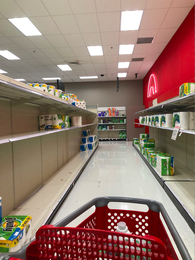
On March 12th, at 7:45 AM, as I briskly walked through Target down the bare aisles of where paper towel and pasta were supposed to be, it hit me that what we were about to go through was going to have a significant impact on our lives. Forty-five minutes later, panic had begun to set in.
Thoughts of "how long will this shopping trip be able to sustain us for if we can't leave to get more food?" followed by "how much is this going to cost, where will I put it all, and how do I make sure we don't waste any of it?" flooded my mind. I imagine many people experienced similar thoughts the first time (if not the first few times) they went to the store at the start of this pandemic. Many people are facing these roadblocks:
How does one combat these issues? Creating a plan and managing pantry and fridge organization, similar to how you would organize your closet, is essential. By following these six steps, you can develop sustainable habits that will extend beyond quarantine, and it will save you time and money in the long-run. The 6 Steps:
To assist with this, I have compiled a few of my favorite resources to help with extending the life of your produce and prioritize what you need to eat first to reduce waste:
I am also attaching 2 FREE printable downloads to help with your weekly meal planning and grocery shopping! What is your biggest challenge when trying to keep your pantry and refrigerator under control?
The phrase "there aren't enough hours in a day" generally rings true during the usual hustle-and-bustle of our busy lives. Right now, however, during the COVID-19 outbreak, we are in a unique situation. We are staying at home more than usual due to self-quarantining in an attempt to keep healthy and flatten the curve.
This situation poses the question: "What should I do if I have some extra time at home?"
Hours of sunlight are getting longer, and we are spending more time at home than usual! What better time than NOW to jumpstart spring cleaning & decluttering and get a fresh start!
Spring Cleaning & Decluttering is HEALTHY!
Spring cleaning & decluttering is therapeutic! Several health benefits come along with going through your house and clearing your clutter:
Not sure where to start? Here are some tips:
What is the first area in your home that you want to tackle & declutter this spring?
|
Utterly UnclutteredHelping feed your urge to purge clutter from your life! DISCLOSURE: My blog posts may contain affiliate links. This means that I earn a commission from qualifying purchases should you decide to make a purchase through my links, at no additional cost to you!
Archives
March 2024
Categories
All
|
|||||||||||||||||||||||||||||

